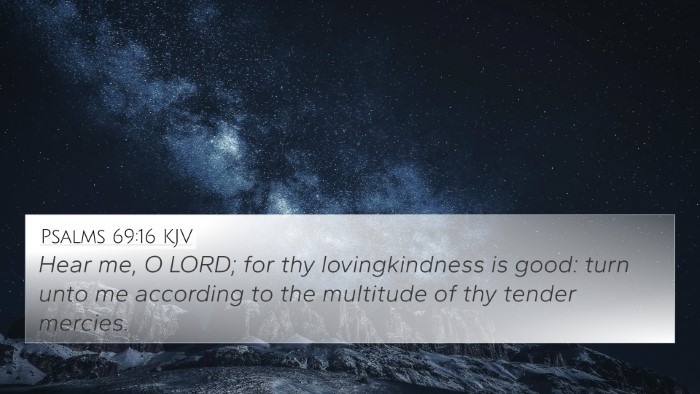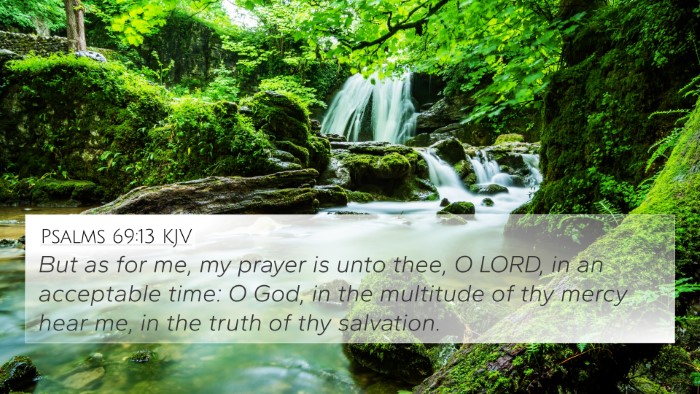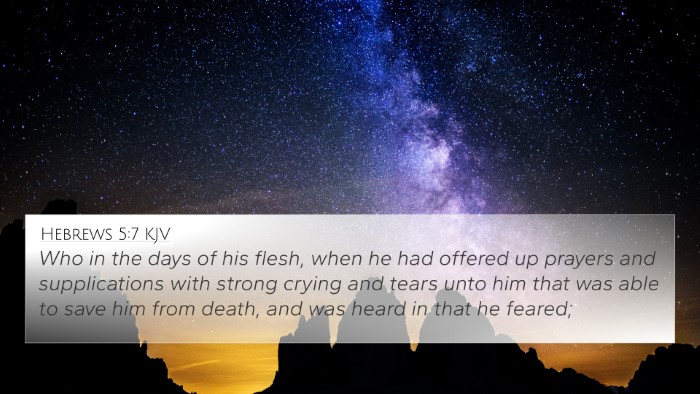Understanding Psalms 40:11
Psalms 40:11 states: "Do not withhold your mercy from me, O Lord; may your love and your truth always protect me." This verse expresses a deep plea for divine mercy and protection, highlighting the essential themes of God's unfailing love and truth in the life of a believer.
Context and Background
In this psalm, the psalmist reflects on personal struggles and the ever-present need for God's grace. This is consistent with the broader context of the Psalms, where the author often acknowledges their reliance on God's mercy and guidance.
Commentary Insights
- Matthew Henry: Henry notes that the plea for mercy is a recognition of God's nature as loving and compassionate. He emphasizes how this request is grounded in the psalmist’s awareness of his own weaknesses and failures.
- Albert Barnes: Barnes underscores the importance of love and truth as foundational attributes of God that offer protection and guidance. He suggests that the psalmist's reliance on these attributes signifies a deep trust in God’s character.
- Adam Clarke: Clarke reflects on the importance of divine mercy, stating that it can lead to spiritual renewal. He connects this request with God’s deliverance from sin and adversity, echoing the theme of redemption throughout Scripture.
Thematic Connections
The themes found in Psalms 40:11 resonate deeply throughout the Bible, linking it thematically to various scriptures that express the necessity of God's mercy and truth.
- Psalm 136: This psalm repeatedly emphasizes God's steadfast love, making a connection with the plea for mercy in Psalms 40:11.
- Proverbs 3:3-4: These verses speak of not letting love and faithfulness forsake you, which aligns with the request for protection through God’s love and truth.
- Hebrews 4:16: This New Testament verse encourages believers to approach God’s throne of grace with confidence, mirroring the heartfelt request for mercy in the psalm.
- Lamentations 3:22-23: These verses reflect on God's mercies being new every morning, emphasizing the enduring nature of His love and faithfulness.
- Psalm 91:1-2: Describes the safety found in God, reinforcing the idea of divine protection mentioned in Psalms 40:11.
- Isaiah 54:10: Here, God’s compassion and unwavering commitment are mentioned, which can be linked back to the psalmist's plea for mercy.
- Romans 8:38-39: Paul expresses confidence in the separation from God’s love, relating to the preservation of God's love as discussed in this psalm.
Connections Between Bible Verses
When examining Psalms 40:11, we understand the broader narrative of Scripture through various inter-Biblical dialogues that amplify its themes:
- Cross-referencing with Psalms: Other psalms, like Psalm 25:10, further illustrate God's paths being mercy and truth, paralleling the plea in 40:11.
- Linking to New Testament Theology: The call for mercy resonates with Jesus’ message in the Gospels where He emphasizes God's limitless mercy towards sinners (Matthew 9:12-13).
- Thematic Bible verse connections: The idea of God's protective love can be expanded to 1 John 4:16, emphasizing knowing and relying on God's love in our lives.
How to Use Bible Cross-References
Utilizing tools for Bible cross-referencing allows a deeper understanding of how different scriptures interact and support each other. Here are some methods:
- Bible Concordance: This resource can help locate keywords such as "mercy" and "truth" to find related verses across the Bible.
- Cross-reference Bible Study: Engage in comparative studies through noted verses in commentaries for a holistic understanding of themes.
- Bible Reference Resources: Using cross-reference guides aids in identifying connections between Old and New Testament scriptures, enhancing biblical comprehension.
Conclusion
In summary, Psalms 40:11 encapsulates a heartfelt appeal for God's mercy, highlighting the significance of His enduring love and truth. By examining this verse alongside others, one can appreciate the interconnectedness of biblical teachings and their application in our understanding of God's character and our dependence on Him.











